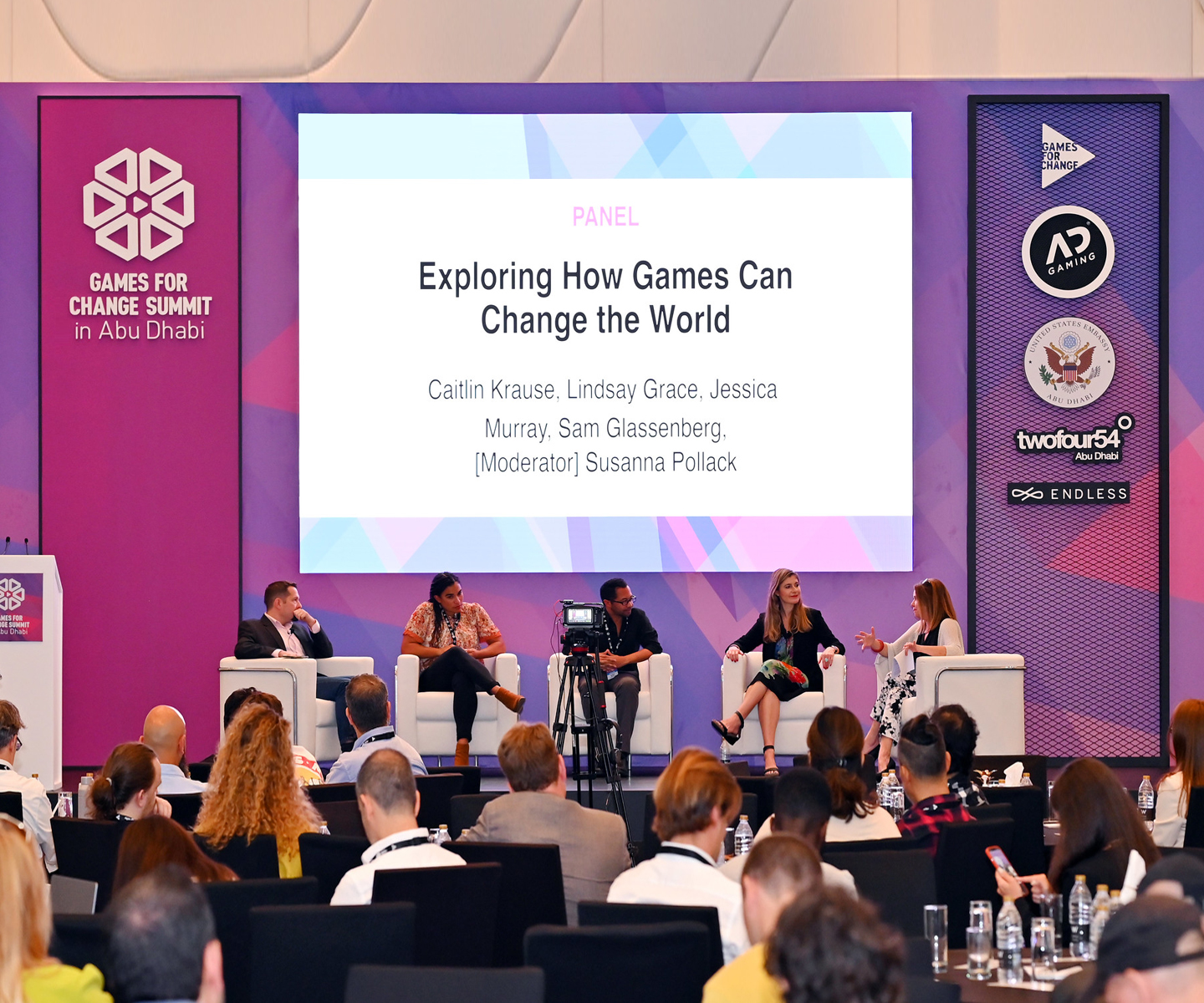Lindsay Grace has been creating his own video games since he was 10 years old. But unlike the first-person-shooter or multiplayer war games that have long been the most popular sellers, Grace’s games are designed to entertain while sneaking in life lessons along the way.
There’s the game where a player must hug a teddy bear to move on to the next level. There are games that encourage people to avoid stereotypes and judge by behavior instead. There are games that teach players how to recognize sexual harassment, how to speak Mandarin Chinese, and how to differentiate between fake news and real news. Grace has made games that serve as teaching opportunities about racism, sexism, violence, love, compassion, psychological development, journalism, and disinformation.
“We forget that we perceive play as an
opportunity to understand something.”
“We forget that we perceive play as an opportunity to understand something,” said Grace, the Knight Chair in Interactive Media at University of Miami. “I had recognized that people had learned a tremendous amount of information about Pokémon or about some world that was completely fictitious. So I thought, ‘What if they were actually learning about science? What if they were learning about something that was also useful to them in the real world?’”
Those questions have guided Grace’s career and have landed him an expanded role at the University of Miami. Already an associate professor in the University’s School of Communication with three books and nearly 100 academic papers to his name, Grace now has a joint appointment with the Frost Institute for Data Science & Computing. There, Grace will work with the Human Centered Design and Computing group where he will help shape the Institute’s strategy and direction on research projects and collaborations within and outside the Institute, according to Kim Grinfeder, director of Creative Technologies and the XR Initiative at IDSC.
“Grace’s unique insights into interactive technology, game dynamics, and user-engagement strategies derived from his research will enhance IDSC’s understanding of human-computer interaction and contribute to designing more intuitive, engaging digital interfaces,” Grinfeder said. “His proven capacity for high-quality research and ability to articulate complex concepts will significantly enrich the Institute’s academic environment and research output.”
 Grace fell in love with video games when he was a child growing up in Boston. At age 4, he became sick and spent months in Boston Children’s Hospital. He found solace one day when his nurses allowed him 20 minutes in the arcade downstairs, spending the whole time playing a car-racing video game. A few years later, he discovered that his elementary school had a computer lab and he started playing other games like Lode Runner. Before long, he was designing his own games.
Grace fell in love with video games when he was a child growing up in Boston. At age 4, he became sick and spent months in Boston Children’s Hospital. He found solace one day when his nurses allowed him 20 minutes in the arcade downstairs, spending the whole time playing a car-racing video game. A few years later, he discovered that his elementary school had a computer lab and he started playing other games like Lode Runner. Before long, he was designing his own games.
By the time he reached college and started studying English and computer science, Grace wondered whether games could be more than just mindless entertainment, more than just racing or shooting or saving princesses. It was the early 2000s and basic educational games were becoming popular, but Grace felt they could be so much more.
He uses the example of history lessons to make his point. Some people don’t care for the subject in school, but they find themselves learning about historical events through other media. In some cases, that means Hollywood blockbusters or documentary films. In others, that means video games like Civilization where players are building their world but being introduced to historical leaders and scientific breakthroughs along the way.
“I wanted to remind people of all the opportunities that we have to engage folks in topics that they might not have engaged in had they not been enticed through games,” he said.

That goal has led Grace on an unconventional career path where he served as a professor and researcher in game programs at the Illinois Institute of Art in Chicago, Miami University in Ohio, and American University in Washington, D.C., before moving to the University of Miami. He curates the Games for Change Festival, which brings in game designers from around the world each year, and serves as a consultant trainer for the U.S. State Department working in Malaysia, Singapore, Turkey, and elsewhere to help train the next generation of socially conscious game developers. Grace even went to Cuba to train game developers on an island where resources, internet connections, and intellectual freedom are scant, but the passion for gaming is strong.
“He wants to find new ways to mine and create huge
datasets using the power of collaborative gaming.”
Now firmly entrenched at UM, Grace is excited about the chance to work with his new colleagues at IDSC who come from very different educational and cultural backgrounds, opening him up to new ideas and new areas of expertise. And given the heavy data science mandate of IDSC, he wants to find new ways to mine and create huge datasets using the power of collaborative gaming. In that case, players think they’re simply enjoying a role-playing game, but the choices they make are feeding a dataset that he and other researchers can mine for new insights.
“Similar to the idea that rather than just peddling on the elliptical, you’re actually feeding power back into the grid,” he said. “So let’s take that energy that’s usually just done for personal health and feed it back into the system and get some more benefit out of it.”
Lindsay Grace on Wikipedia | in The Conversation
Tags: Collaborative Gaming, Games for Change, human-computer interaction, Lindsay Grace, Video Games



